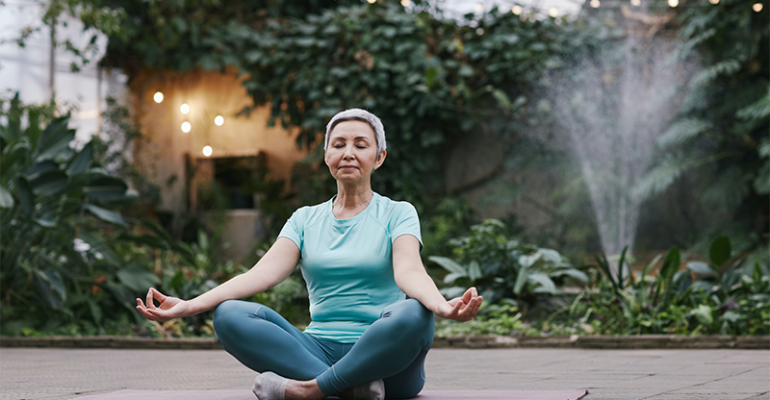7 Anti-Cancer Benefits of Exercise
As the days get longer and warmer here in the northern hemisphere, we find ourselves much more drawn to the outdoors – enjoying walks and admiring the earth’s abundance once again. This time of year is so great for our health, encouraging us to receive plenty of healing benefits from nature itself.
For those with compromised health and chronic dis-eases such as cancer, you may find your motivation and even ability to enjoy this natural healer is limited. Exhaustion and feeling generally unwell can prevent you from getting outside. However, physical activity is so integral to health, healing and recovery, as much as any treatment plan or nutritional approach. So many studies confirm the anti-cancer benefits of exercise, from building strength to boosting cardiovascular function and the immune system. Something as simple as taking a short walk around your garden can do wonders for your body.
In one study, compared to sedentary individuals, those who increased the duration, intensity or frequency of their daily exercise routines reduced their chance of developing colon cancer by 30-40%. Another study confirmed that physically active women have a 20-80% lower risk of developing breast cancer (depending on several factors) than their sedentary counterparts.
Below, we’ll look further into the top 7 anti-cancer benefits of exercise.
- Your immune system gets a boost
Exercise boosts your immune system tenfold. In general, physical activity will improve cell function and circulation, but immune cells in particular will flow much more efficiently to the areas they are needed most, e.g. cancer cells. The better supported this system is, the easier it is for immune cells to find and attack any malignant cells, viruses or bacteria in the body.
2. Increased oxygen & nutrient delivery to cells
Cancer struggles to thrive in an oxygen-rich environment, so it makes sense to frequently boost your oxygen. This is why many of those on a cancer journey will research into hyperbaric oxygen therapy. The muscles and joints need gentle movement and various pressures to help the cells function and allow a smoother flow of nutrients into the cells and conversely, the removal of toxins from the cells to maintain homeostasis. Exercising also benefits the heart and lungs which improves blood circulation and oxygen utilisation.
3. Exercise stimulates the lymphatic system
The lymphatic system is important for general and specific immune responses to function at their best, working to flush and eliminate toxins out of the body. If this system becomes clogged up, your overall health can suffer and potentially even develop lymphedema. That’s where exercise comes in… it is key to a healthy lymphatic system. Gentle aerobic exercise, jump-roping or yoga flows are fantastic ways to increase lymph and blood flow throughout the body.
If you are bed-bound or have limited mobility, massage is a great alternative to ensure the lymphatic system remains stimulated. Whether you administer self-massage yourself or have a carer or professional to offer this for you, there is a wealth of information online about massage techniques to support flow.
4. Exercise increases sweat production to remove toxins
Sweating is powerful medicine! If you are able to engage in a moderate exercise practice – or even in a stimulated environment such as hot yoga or a sauna – sweating is a potent way to naturally detox and rid the body of toxins. Always be mindful and make sure to only exercise within your capability to do so.
5. Exercise decreases stress levels
Managing stress levels is critical in any chronic illness or cancer journey. Living in an unbalanced and heightened state has very damaging effects on the body, with studies showing the influence chronic stress can have on illness and disease. Not only does physical activity boost endorphins to counteract stress, but it also decreases harmful levels of cortisol, the hormone associated with stress. The best part? All it takes is a short 20-30 minute walk to reap the benefits. You could even utilise the stairs at home… climb them a few times if you are unable to get outdoors.
6. Exercise is a natural anticoagulant
Did you know that exercise can thin the blood and reduce blood cell clumping? Although this might not seem a priority in your cancer journey, it does feed into the holistic belief that your whole body needs supporting in order for it to run efficiently and bring it back into balance. If the blood thickens or there is clotting anywhere in the body due to lack of exercise, all the good immune cells, oxygen and nutrients will struggle to reach the places where they are needed most.
7. Exercise relieves depression and insomnia
Movement gives us the feel-good factor! As mentioned earlier, your body releases mood-boosting endorphins after engaging in exercise, and these endorphins enhance mental health and positivity to help you handle stresses more effectively, whilst supporting your overall wellbeing.
Serotonin and dopamine are also released when you exercise, and these chemicals are not just mood-enhancing, but they encourage better sleep too. As a result, better sleep and improved mood then strengthens the immune system… it’s a win-win!
We hope the above top anti-cancer benefits of exercise has inspired you to take control of your health and find a way to move your body as best you can during a cancer or chronic illness journey. Exercise is an important component in your healing journey; at the very least you’ll feel better, stronger and happier all round.
At Together Against Cancer, we often host gentle movement classes such as Yin Yoga or Tai Chi for our clients living with cancer. Please keep an eye on our events page for an updated schedule.


